
TAIWANIA
Scope & Guideline
Fostering innovation in ecological sciences since 1947.
Introduction
Aims and Scopes
- Biodiversity Documentation:
The journal publishes extensive research on new species discoveries and taxonomic revisions, contributing significantly to the knowledge of flora and fauna in Asia, particularly in Taiwan, the Philippines, Vietnam, and surrounding regions. - Ecological Studies:
Research in TAIWANIA often includes ecological assessments, habitat preferences, and the interaction of species within their environments, providing insights into biodiversity conservation and ecological dynamics. - Molecular Phylogenetics:
A notable focus on molecular techniques to resolve taxonomic ambiguities and understand evolutionary relationships among species, facilitating clearer classifications and species descriptions. - Conservation Biology:
The journal emphasizes the importance of conservation strategies and ecological sustainability, often highlighting studies that assess the impact of anthropogenic activities on biodiversity. - Citizen Science Contributions:
TAIWANIA encourages the involvement of citizen science in biodiversity monitoring, showcasing studies that utilize citizen-collected data to enhance understanding of species distributions and conservation priorities.
Trending and Emerging
- Species Discovery and Description:
An increasing number of papers are focused on the discovery and formal description of new species, reflecting an ongoing commitment to documenting biodiversity, especially in underexplored regions. - Molecular Techniques in Taxonomy:
There is a significant trend towards the use of molecular techniques, such as DNA barcoding and phylogenetic analysis, to resolve taxonomic issues and provide deeper insights into species relationships. - Ecological and Environmental Assessments:
Research related to ecological assessments and the impact of environmental changes on species distribution is on the rise, indicating a growing emphasis on understanding biodiversity in the context of climate change and habitat alteration. - Conservation Strategies and Biodiversity Hotspots:
Papers addressing conservation strategies in biodiversity hotspots are increasingly prominent, emphasizing the need for practical approaches to preserve endemic species and their habitats. - Citizen Science Engagement:
The incorporation of citizen science in biodiversity studies is emerging as a significant theme, reflecting a shift towards collaborative approaches in data collection and conservation efforts.
Declining or Waning
- Traditional Taxonomic Studies:
There seems to be a decline in purely traditional taxonomic studies that do not incorporate molecular techniques. As molecular phylogenetics gains traction, the reliance on morphological studies alone is decreasing. - General Flora Surveys:
There is a notable reduction in the publication of broad flora surveys that do not focus on specific regions or new species discoveries, as the journal shifts towards more detailed and targeted studies. - Invasive Species Research:
Research focusing solely on invasive species without a broader ecological context appears to be declining, as the journal now favors studies that integrate invasive species within comprehensive ecological frameworks.
Similar Journals
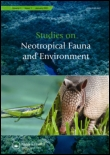
STUDIES ON NEOTROPICAL FAUNA AND ENVIRONMENT
Exploring the Richness of Neotropical BiodiversitySTUDIES ON NEOTROPICAL FAUNA AND ENVIRONMENT is a distinguished academic journal published by Taylor & Francis Ltd, dedicated to advancing the fields of Animal Science, Zoology, and Ecology. With an ISSN of 0165-0521 and an E-ISSN of 1744-5140, this journal has been a significant outlet for scholarly research since its inception in 1976, continuing to provide critical insights into neotropical biodiversity and the environmental intricacies of this rich ecological region through 2024. Recognized in the Q3 category for both Animal Science and Ecology, the journal ranks at #232/490 in Animal Science and Zoology and #402/721 in Ecology, marking it as a valuable resource for researchers, professionals, and students interested in ecological and zoological studies. By offering a platform for innovative research and comprehensive reviews, the journal aims to bridge the gap between theory and practical application, facilitating a deeper understanding of the unique challenges and conservation strategies relevant to neotropical ecosystems. Although not an open-access journal, it plays a crucial role in fostering academic discourse and knowledge dissemination in its field, ensuring that critical advancements in understanding neotropical fauna and environmental dynamics reach a diverse and engaged audience.
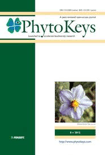
PhytoKeys
Advancing plant science through open access.PhytoKeys is a prominent open-access journal published by PENSOFT PUBLISHERS that has become a vital resource in the fields of Agricultural and Biological Sciences, Ecology, Evolution, Behavior and Systematics, and Plant Science. Since its inception in 2010, PhytoKeys has provided a platform for researchers and scholars to disseminate high-quality botanical research, making it increasingly relevant globally. The journal enjoys a commendable impact factor reflected in its 2023 ranking, positioning it in the Q2 quartile across multiple categories, including the 61st percentile in Agricultural and Biological Sciences (miscellaneous) and the 53rd percentile in Plant Science. With a dedicated editorial board and a mission to advance our understanding of plant diversity, taxonomy, and conservation, PhytoKeys supports the academic community by facilitating accessibility to cutting-edge research. Its commitment to open access ensures that valuable knowledge is readily available to researchers, professionals, and students worldwide, fostering collaboration and innovation in plant sciences.
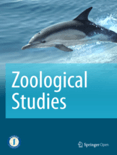
ZOOLOGICAL STUDIES
Advancing understanding in the realm of animal science.Zoological Studies, published by the Biodiversity Research Center, Academia Sinica, stands as a pivotal journal in the fields of animal science and zoology. With the ISSN 1021-5506 and E-ISSN 1810-522X, this Taiwanese journal features a blend of pioneering research that spans over three decades, from 1994 to 2024, fostering a deep understanding of biodiversity and zoological phenomena. Recognized for its scholarly contributions, Zoological Studies holds an esteemed Q2 ranking in Animal Science and Zoology for 2023, positioning it among the top-tier journals in its category with a Scopus rank of #164 out of 490—reflecting its strong impact and outreach. While currently not open access, the journal aims to disseminate essential findings and discussions that advance ecological knowledge and inspire future research endeavors. Researchers, professionals, and students alike will find this journal an invaluable resource for accessing critical studies that drive innovation and conservation efforts in the field of zoology.
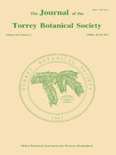
JOURNAL OF THE TORREY BOTANICAL SOCIETY
Elevating the discourse in botanical research and education.JOURNAL OF THE TORREY BOTANICAL SOCIETY is a prominent academic journal dedicated to advancing the fields of botany and ecology, published by the esteemed TORREY BOTANICAL SOCIETY. With an ISSN of 1095-5674 and an E-ISSN of 1940-0616, this journal serves as a critical platform for researchers, professionals, and students to share their findings and insights. Despite its status in the Q4 category for the 2023 rankings across Ecology, Plant Science, and Ecology, Evolution, Behavior and Systematics, the journal continues to foster significant discourse and collaboration in the botanical sciences, aiming to elevate the understanding of plant biology and ecosystems. Its open access options enhance accessibility, ensuring that groundbreaking research reaches a wider audience. Published in the United States, the journal features work from both established scientists and emerging scholars, making it a vital resource for anyone involved in the study of plants and their environmental interactions. Explore the JOURNAL OF THE TORREY BOTANICAL SOCIETY to engage with cutting-edge research and contribute to the ongoing dialogue in the botanical sciences.

RAFFLES BULLETIN OF ZOOLOGY
Advancing Knowledge in Animal Science and EcologyRaffles Bulletin of Zoology, published by the National University of Singapore's Lee Kong Chian Natural History Museum, serves as a prestigious platform for the dissemination of cutting-edge research in Animal Science and Zoology, as well as Ecology, Evolution, Behavior and Systematics. With a current impact factor reflective of its Q2 category in both fields, this journal not only enhances its visibility in the academic community but also provides valuable insights into the complexities of biodiversity and conservation efforts. Covering a wide array of topics, Raffles Bulletin facilitates interdisciplinary collaboration and serves as an essential resource for researchers, professionals, and students alike. It is indexed in Scopus, ranking #233 out of 490 in Animal Science and Zoology and #406 out of 721 in Ecology, ensuring that the research published contributes significantly to the global discourse on wildlife and ecosystem management. Since its inception in 1996, this journal has bridged gaps in knowledge and continues to foster a deeper understanding of the living world.

European Journal of Taxonomy
Empowering researchers with accessible ecological insights.The European Journal of Taxonomy is a distinguished open access journal, published by the MUSEUM NATL HISTOIRE NATURELLE in France, dedicated to the rich and dynamic field of taxonomy, ecology, and systematics. Since its inception in 2011, this journal has aimed to provide a platform for the dissemination of high-quality research and innovative methods relevant to the study of biodiversity and species classification. With a commendable Q2 ranking in the Ecology, Evolution, Behavior and Systematics category as of 2023, the journal ranks 380 out of 721 in Scopus, highlighting its pivotal role in advancing scientific knowledge in these essential areas. Researchers and students alike will find valuable resources and contributions that address pressing ecological and evolutionary questions from 2015 to 2024. By promoting open access, the European Journal of Taxonomy ensures that vital research is accessible to a broader audience, fostering collaboration and discourse among professionals striving to enhance our understanding of the natural world.
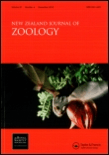
NEW ZEALAND JOURNAL OF ZOOLOGY
Connecting Research and Conservation in Zoology.NEW ZEALAND JOURNAL OF ZOOLOGY, published by Taylor & Francis Ltd, offers a crucial platform for the dissemination of high-quality research in the field of zoology and animal science. With an ISSN of 0301-4223 and an E-ISSN of 1175-8821, this journal has been a valuable resource since its inception in 1974 and continues to contribute significantly to the academic community, with a converged years span extending to 2024. The journal holds a commendable Q3 ranking in the 2023 category of Animal Science and Zoology, and ranks #175 out of 490 in Scopus, placing it in the 64th percentile of its category. While it is not an Open Access journal, researchers can still access a wide range of studies that delve into various aspects of zoology. With its robust editorial standards and commitment to advancing knowledge in animal science, the NEW ZEALAND JOURNAL OF ZOOLOGY serves as an essential resource for researchers, professionals, and students interested in the complexities of wildlife and ecological studies.

Bulletin de la Societe Linneenne de Lyon
Illuminating the Path of Life Sciences DiscoveryBulletin de la Societe Linneenne de Lyon is a distinguished journal in the field of natural sciences, published by Société Linneenne de Lyon, a renowned institution in the heart of France. This journal, bearing the ISSN 2554-5280, serves as a crucial platform for the dissemination of high-quality research articles, reviews, and discussions that focus on the diversity of life and its conservation, reflecting the foundational principles established by Carl Linnaeus. Although it operates under a traditional access model, the bulletin significantly contributes to the advancement of botany, zoology, and ecology by providing a forum for original research that often garners attention from scholars and practitioners alike. With a commitment to fostering collaboration and dialogue among researchers, this journal is positioned as a vital resource for anyone dedicated to understanding the complexities of biological sciences and systems. The impact of its publications is amplified by its ties to a prominent academic community, making it an essential read for professionals, researchers, and students eager to stay informed on the latest developments in their fields.

ORGANISMS DIVERSITY & EVOLUTION
Unveiling Nature's Complexity: A Journal of Discovery and DialogueOrganisms Diversity & Evolution is a premier academic journal published by Springer Heidelberg, dedicated to advancing the fields of ecology, evolution, behavior, and systematics. Established in 2001 and continuing through 2024, this journal plays a crucial role in disseminating high-quality research that explores the complexities of biological diversity and evolutionary processes. With a commendable 2023 Scopus ranking of #253/721 in its category, placing it in the 64th percentile, and categorized in the Q2 quartile for Ecology and Evolution, it consistently attracts contributions from leading scientists and researchers worldwide. Although it operates on a subscription basis, the journal's rigorous peer-review process and dedication to impactful scientific discourse make it an invaluable resource for academics, practitioners, and students keen on understanding the intricate relationships that shape our biodiversity. By highlighting innovative research and fostering discussions on urgent ecological challenges, Organisms Diversity & Evolution serves as a vital platform for those committed to conservation and evolutionary biology.
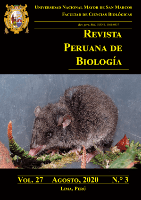
REVISTA PERUANA DE BIOLOGIA
Advancing Biological Research Through Open AccessREVISTA PERUANA DE BIOLOGIA, an esteemed journal published by the Universidad Nacional Mayor de San Marcos, Faculty of Biological Sciences, has been a vital platform for disseminating significant biological research since its inception in 1974. With an Open Access model, this journal ensures that high-quality research is freely available to readers across the globe, fostering the advancement of knowledge within the field of agricultural and biological sciences. Despite proprietary challenges, the journal has secured a respectable Q3 category ranking in Agricultural and Biological Sciences and currently holds a 137th rank in Scopus among its peers. By embracing a comprehensive scope, REVISTA PERUANA DE BIOLOGIA encourages submissions that contribute to diverse biological topics, making it an essential resource for researchers, professionals, and students looking to enhance their understanding and expertise. With its ongoing commitment to excellence, this journal remains a cornerstone of biological research in Peru and beyond, reinforcing the importance of collaboration and knowledge sharing in the scientific community.